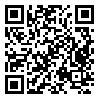Articles accepted at the time of publication
Back to the articles list |
Back to browse issues page
1- Assistant Professor Of Education Psychology ,Department of Education Science, Hakim Sabzevari University, Sabzevar, Iran
2- Assistant Professor in FLE Didactics, Departement of French Language and Literature, University of Hakim Sabzevari, Sabzevar, Iran ,a.fesanghari@hsu.ac.ir
3- PhD in Educational Management, Faculty of Management and Accounting, University of Tehran, Qom, Iran
2- Assistant Professor in FLE Didactics, Departement of French Language and Literature, University of Hakim Sabzevari, Sabzevar, Iran ,
3- PhD in Educational Management, Faculty of Management and Accounting, University of Tehran, Qom, Iran
Abstract: (46 Views)
Learning French as a foreign language presents unique challenges that may sometimes reduce students' motivation and academic performance. This study aimed to examine the relationship between cognitive and metacognitive strategies, mental vitality, and academic buoyancy among French language students. A mixed-method approach (quantitative and qualitative) was employed in two phases. In the quantitative phase, data were collected using standardized questionnaires on academic buoyancy, mental vitality, and cognitive and metacognitive strategies. The statistical population included all 61 French language students at Hakim Sabzevari University, who participated in the study through a census sampling method. In the qualitative phase, semi-structured interviews were conducted with 10 French language professors from Iranian universities to explore their perspectives and experiences regarding academic buoyancy and its influencing factors. Quantitative data were analyzed using descriptive and inferential statistical methods, while qualitative data were examined through inductive content analysis. The quantitative findings revealed that the use of cognitive and metacognitive strategies, along with mental vitality, positively influenced students' academic buoyancy. Furthermore, qualitative results indicated that various factors, including social variables, family, educational emotions, learner goal-setting, learning strategies, cognitive functions, communication skills, cognitive and emotional skills, academic behavioral motivators, educational content, teacher-related personal variables, teaching skills and techniques, and the teacher's motivational approach, significantly impact students' academic buoyancy.
Keywords: Cognitive and metacognitive strategies, mental vitality, academic buoyancy, French language studentsLearning
Article Type: مقالات علمی پژوهشی |
Subject:
language teaching
Send email to the article author
| Rights and permissions | |
 |
This work is licensed under a Creative Commons Attribution-NonCommercial 4.0 International License. |






